A Greek Drama (and Tragedy)
S tepping onto Greek soil after cycling through Italy feels like travelling back in time. The scenery has a rawness to it that is less manicured and domesticated by the human touch. The land itself is redder, more burnt; a hint at the country’s fiery past. The black and ochre-coloured porous rocks that litter the coastline (shaped by pyroclastic flow) suggest what a place it was like as the mainland and it’s islands were formed out of the violent eruptions that spewed from the bowls of the Earth, millions of years ago.
tepping onto Greek soil after cycling through Italy feels like travelling back in time. The scenery has a rawness to it that is less manicured and domesticated by the human touch. The land itself is redder, more burnt; a hint at the country’s fiery past. The black and ochre-coloured porous rocks that litter the coastline (shaped by pyroclastic flow) suggest what a place it was like as the mainland and it’s islands were formed out of the violent eruptions that spewed from the bowls of the Earth, millions of years ago.
 As soon as my cycling companion, Richie, and I started to track the Ionian coastline from the port of Igoumenitsa towards Athens, it soon became apparent that the land was going to be much more unforgiving (not to mention the severely potholed roads) than the groomed composure of the Italian landscape. The harshness of the scorched earth – softened by the deep azure of the sea as it meets the blue open sky – only heightens this sense that Greece is, and always has been, a country of contrasts.
As soon as my cycling companion, Richie, and I started to track the Ionian coastline from the port of Igoumenitsa towards Athens, it soon became apparent that the land was going to be much more unforgiving (not to mention the severely potholed roads) than the groomed composure of the Italian landscape. The harshness of the scorched earth – softened by the deep azure of the sea as it meets the blue open sky – only heightens this sense that Greece is, and always has been, a country of contrasts.
A Greek Drama
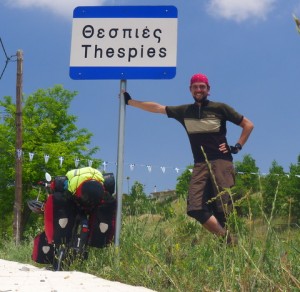 On a personal level, I am excited to be travelling through the cradle of western civilisation and the birthplace of the dramatic tradition that has had a huge impact in shaping me into who I am today. From my school years through to A-level, and later, to thoe heady halcyon days at the Bretton Hall School of Dance and Drama, the tradition of Greek Tragedy has been a foundation stone for every play, monologue or improvised performance I have performed in. Finally, I was returning to my Thespian roots. This time, on a bike. Interestingly, the word tragedy is derived in classical Greek from tragos (he-goat) and aeidein (to sing/ode); meaning literally ‘goat song’. Forgive me for conflating the two here but I do like the coincidental connection with the legendary Ethiopian goat herder, Kaldi, who was reputed to have discovered the coffee berry in the 7th century. Maybe goats, drama and the pursuit of the bean have more in common than meet the eye? Anyway, back to the script.
On a personal level, I am excited to be travelling through the cradle of western civilisation and the birthplace of the dramatic tradition that has had a huge impact in shaping me into who I am today. From my school years through to A-level, and later, to thoe heady halcyon days at the Bretton Hall School of Dance and Drama, the tradition of Greek Tragedy has been a foundation stone for every play, monologue or improvised performance I have performed in. Finally, I was returning to my Thespian roots. This time, on a bike. Interestingly, the word tragedy is derived in classical Greek from tragos (he-goat) and aeidein (to sing/ode); meaning literally ‘goat song’. Forgive me for conflating the two here but I do like the coincidental connection with the legendary Ethiopian goat herder, Kaldi, who was reputed to have discovered the coffee berry in the 7th century. Maybe goats, drama and the pursuit of the bean have more in common than meet the eye? Anyway, back to the script.
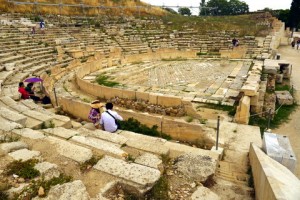 The Ancient Greeks certainly knew a thing or two about acoustics. To sit in the open air Theatre of Dionysus (Ancient Greek god of wine and patron of drama) on the southwest slope of the Acropolis in Athens was a special moment. Seating up to 25,000 spectators in its heyday, every audience member would have been able to hear a pin drop or the words of the chorus and characters performing a dramatic work by either Sophocles, Euripides, Aristophanes or Aeschylus. It makes you realise just how drama – along with art, philosophy, music, and ‘the games’ – were vital cultural threads that formed part of the rich tapestry of ancient Greek life. It’s moments like these when I wish I could only travel back in time to experience the atmosphere as Sophocles’ Oedipus Rex or Antigone was being premiered to an expectant Athenian audience, almost 2,500 years ago.
The Ancient Greeks certainly knew a thing or two about acoustics. To sit in the open air Theatre of Dionysus (Ancient Greek god of wine and patron of drama) on the southwest slope of the Acropolis in Athens was a special moment. Seating up to 25,000 spectators in its heyday, every audience member would have been able to hear a pin drop or the words of the chorus and characters performing a dramatic work by either Sophocles, Euripides, Aristophanes or Aeschylus. It makes you realise just how drama – along with art, philosophy, music, and ‘the games’ – were vital cultural threads that formed part of the rich tapestry of ancient Greek life. It’s moments like these when I wish I could only travel back in time to experience the atmosphere as Sophocles’ Oedipus Rex or Antigone was being premiered to an expectant Athenian audience, almost 2,500 years ago.
Camp ‘Dung’
 The other drama being played out at close quarters had to be straight out of David Attenborough documentary. A couple of day’s ride away from Patra, we found a perfect wild camp spot in a natural ‘amphitheatre’ protected by Olive trees, thorny bushes and the occasional spruce. At the centre was an old Holm Oak tree that we pitched our tents beside. Erecting them in the darkness, the reflection of a one-eyed badger, fox or deer (or some other wild beast) from the light of our head torches presented itself on the high perimeter above us and watched us intently like a blinking Cyclops in the dead of night until we had stopped making a racket. To be barked at by this beast was a telling reminder that we were wild camping in territory that was not our own. We were merely uninvited guests for the night. As dawn broke, I awoke to the sound of rustling around the tent. Quickly zipping back the flysheet to find out what the commotion was all about, I was greeted with the sight of a dozen or so young wild boars snuffling for breakfast in the undergrowth, watched over by two older, mother boars. I think they were just as startled as I was.
The other drama being played out at close quarters had to be straight out of David Attenborough documentary. A couple of day’s ride away from Patra, we found a perfect wild camp spot in a natural ‘amphitheatre’ protected by Olive trees, thorny bushes and the occasional spruce. At the centre was an old Holm Oak tree that we pitched our tents beside. Erecting them in the darkness, the reflection of a one-eyed badger, fox or deer (or some other wild beast) from the light of our head torches presented itself on the high perimeter above us and watched us intently like a blinking Cyclops in the dead of night until we had stopped making a racket. To be barked at by this beast was a telling reminder that we were wild camping in territory that was not our own. We were merely uninvited guests for the night. As dawn broke, I awoke to the sound of rustling around the tent. Quickly zipping back the flysheet to find out what the commotion was all about, I was greeted with the sight of a dozen or so young wild boars snuffling for breakfast in the undergrowth, watched over by two older, mother boars. I think they were just as startled as I was.
Over muesli and coffee with honey, the dung beetles moved into ‘town’ to clear up and harvest the morning’s valuable deposit left earlier by the pigs. Yes, I do admit that it is not the most palatable of subjects to share on a blog but, my word, these beetles are seriously efficient in, well, clearing up dung. Sometimes they manage to accumulate balls twice their own body size which are diligently defended from other rogue residents in their search for a dung ball of their own. I could go on about the fastidious approach they take towards their own domestic duties but I’ll let the short video clip speak for itself…
Please click here
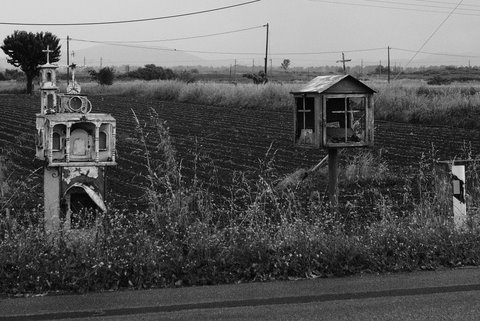 A special aspect of Greek culture that I find truly unique are the roadside memorials and alters that house offerings to the Virgin Mary. Some are in honour of family members, others are anonymous, but all serve as a chilling reminder of how many people are involved in fatal road accidents each year. There are memorials that are lovingly painted and festooned with
A special aspect of Greek culture that I find truly unique are the roadside memorials and alters that house offerings to the Virgin Mary. Some are in honour of family members, others are anonymous, but all serve as a chilling reminder of how many people are involved in fatal road accidents each year. There are memorials that are lovingly painted and festooned with  bright wreaths of flowers, whilst others rust away in a state of dilapidation. Each has its own individuality and as night begins to fall, the road is lit up with the warm glow of flickering oil lamps through the darkness.
bright wreaths of flowers, whilst others rust away in a state of dilapidation. Each has its own individuality and as night begins to fall, the road is lit up with the warm glow of flickering oil lamps through the darkness.
Meeting other cycle tourists has been a real pleasure, and in some cases a source of pure comedy. On a searing hot day, we pulled into a petrol station to fill up on water. We met a lively broad-shouldered Czechoslovakian chap called Josef, who had a wonderful matter-of-fact approach to life. He was doing a cycle tour – fuelled with diluted red wine and Iggy Pop on his MP3 – around the Island of Kefalonia whilst his mates sat and drank beer for two weeks in Crete. The conversation went something like this:
Josef: Where are you cycling to?
Bean on a Bike: We’re cycling to Athens together and then I’m heading on to Turkey.
Josef: Turkey?! They drive like crazy fools. You will die. Then where?
Bean on a Bike: Syria, if it’s safe to travel through.
Josef: Syria?! The roads are far too dangerous. Where next?
Bean on a Bike: Jordon, then Egypt.
Josef: Egypt, you must be joking?! You will die, for sure.
Your destination?
Bean on a Bike: Ethiopia.
Josef: Why in god’s name are you cycling to Ethiopia?
Bean on a Bike: For the coffee.
Josef: For coffee?! You can get an espresso just over there [pointing towards a roadside café], you don’t need to cycle to Ethiopia for a coffee. You are a crazy fool!
I suppose he did have a valid point.
E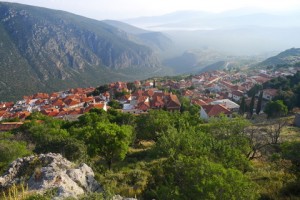 nergising Experience
nergising Experience
There have been other dramas on the road too. After Richie and I decided to go ‘solo’ for a few days and meet up again in Athens, I turned my pedals towards Delphi. The town is a magical place and it’s easy to see why people from lands far and wide would travel to visit and seek prophesy from the Oracle at the Temple of Apollo. Unfortunately, I did not have time to explore the archeological site fully as I had lost all sense of time wondering around the museum’s collection which houses some of the most incredible artifacts such as the mythical Sphinx, or Charioteer. On the cusp of closing time, I did however manage to get a quick snap of the remaining broad columns of the temple from its base but was brusquely ushered off the site by the security guards or were eager to finish their shift. It was a shame that I could not spend more time to explore the remains but the way the security guards (I can’t bring myself to call them visitor assistants) would screech their whistles and bark orders at visitors – as if we were attending some kind of archeological boot camp – I’m not sure if the experience was ever going to be as sublime as I expected it to be.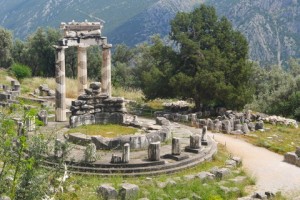 That said, the spectacular restored remains of Tholos of Delphi which stands on the lower terrace of the site is an incredible monument to behold. A stunning testament to the architectural achievements of the classical world. The next day, following a steep climb out of Delphi and an exhilarating descent passed the southern spur of Mount Parnassus, I managed to find a wonderful wild camp spot just outside the village of Thespies. It was pleasantly secluded in a natural depression in the ground close to an unassuming, small whitewashed church that overlooked the agricultural plains below. The day had started out in the usual fashion with clear blue skies and clear air but as the heat steadily built up throughout the day, the telltale signs of cumulonimbus clouds began to mushroom above the mountains; foretelling an impending storm. At first, the rain was a refreshing welcome to the heat and energy-sapping humidity but the clouds started to look threatening and soon enough, 75 kms later, I was pitching my tent as quickly as I could in a full-blown electric storm. The electric displays of sheet and fork lightening was an incredible sight to watch and I could imagine how the Ancient Greeks likened the rumble of thunder to their pantheon of Gods being displeased by the antics of their human playthings from the heights of Mount Olympus, or were settling a dispute of their very own.
That said, the spectacular restored remains of Tholos of Delphi which stands on the lower terrace of the site is an incredible monument to behold. A stunning testament to the architectural achievements of the classical world. The next day, following a steep climb out of Delphi and an exhilarating descent passed the southern spur of Mount Parnassus, I managed to find a wonderful wild camp spot just outside the village of Thespies. It was pleasantly secluded in a natural depression in the ground close to an unassuming, small whitewashed church that overlooked the agricultural plains below. The day had started out in the usual fashion with clear blue skies and clear air but as the heat steadily built up throughout the day, the telltale signs of cumulonimbus clouds began to mushroom above the mountains; foretelling an impending storm. At first, the rain was a refreshing welcome to the heat and energy-sapping humidity but the clouds started to look threatening and soon enough, 75 kms later, I was pitching my tent as quickly as I could in a full-blown electric storm. The electric displays of sheet and fork lightening was an incredible sight to watch and I could imagine how the Ancient Greeks likened the rumble of thunder to their pantheon of Gods being displeased by the antics of their human playthings from the heights of Mount Olympus, or were settling a dispute of their very own.
 Exhausted from the day’s ride, I still could not sleep but was being entertained by the meteorological firework display lighting up the canvas from the relative safety of the confines of my tent. As I began to doze there was an almighty, blinding flash of intense white light. I think I would have jumped out of my skin if I wasn’t zipped up so tightly in my sleeping bag. Blinking in the blue-ish afterglow, a brief negative image of the geodesic frame of my Terra Nova Quasar tent felt like had been burnt onto my retina. Almost immediately afterwards, a deafening bang was followed by a sound that I can only describe as the splitting of air. It was as if the very molecules were being torn apart by some unimaginable force. This was followed by a crackling and fizzing sound that eventually subsided. My own state of physical exhaustion was the only thing that stopped me fully contemplating the seemingly supernatural event that had just occurred.
Exhausted from the day’s ride, I still could not sleep but was being entertained by the meteorological firework display lighting up the canvas from the relative safety of the confines of my tent. As I began to doze there was an almighty, blinding flash of intense white light. I think I would have jumped out of my skin if I wasn’t zipped up so tightly in my sleeping bag. Blinking in the blue-ish afterglow, a brief negative image of the geodesic frame of my Terra Nova Quasar tent felt like had been burnt onto my retina. Almost immediately afterwards, a deafening bang was followed by a sound that I can only describe as the splitting of air. It was as if the very molecules were being torn apart by some unimaginable force. This was followed by a crackling and fizzing sound that eventually subsided. My own state of physical exhaustion was the only thing that stopped me fully contemplating the seemingly supernatural event that had just occurred.
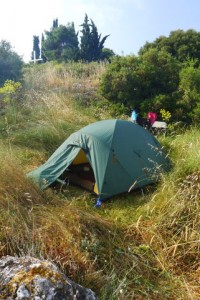 The following morning, I was pondering on the experience over a strong brew of Greek coffee with lashings of honey when I realised the night’s previous experience did really happen. Looking up, there was a tall cross constructed out of two metal girders close to the church that must have acted as the vital contact point for the lightning strike. It was all of twenty-or-so yards away and on closer inspection, still bore the scorch marks from the previous night’s encounter with the forces of nature. Let’s just say it was an energising experience but one of those existential ‘close calls’ that I don’t want to repeat in a hurry.
The following morning, I was pondering on the experience over a strong brew of Greek coffee with lashings of honey when I realised the night’s previous experience did really happen. Looking up, there was a tall cross constructed out of two metal girders close to the church that must have acted as the vital contact point for the lightning strike. It was all of twenty-or-so yards away and on closer inspection, still bore the scorch marks from the previous night’s encounter with the forces of nature. Let’s just say it was an energising experience but one of those existential ‘close calls’ that I don’t want to repeat in a hurry.
Beyond the Bialetti
T hey say things happen for a reason, and this one was surely meant to be. Whilst giving my beloved Bialetti Moka espresso pot a service with a replacement seal and filter plate, a vital part (the cup for the coffee grind) was claimed by the lapping waves and trade winds of the Ionian Sea. The solution? When in Greece, do as the Greeks do. So I’m now the proud owner of a small coffee pot that boils (excuse the pun) coffee-making into its simplest constituent parts: Add coffee. Add water. Light up the stove and stir until the coffee reaches just under boiling point. Let the coffee to settle and pour. Simple. The result is a very different tasting brew. In part, because Greek coffee is roasted lighter than most ‘run-of-the-mill’ blends (There are three roasts; dark, medium and ‘blonde’). But the grind of the bean is much finer, like the consistency of icing sugar. As the grind is not extracted at any point and resides at the bottom of the cup, the coffee has a texture to it that gives it a earthy, almost viscous quality. I have to say that I do very much enjoy Greek Coffee espresso but after a few days, I could not help but to give it a little fortification by adding the excellent highly roasted Caffè Mauro 90 percent robusta, 10 percent arabica blend (Origin: Asia, Brazil) that I managed to stock up on before leaving Italy. Just to give it some extra ‘toasted kick’.
hey say things happen for a reason, and this one was surely meant to be. Whilst giving my beloved Bialetti Moka espresso pot a service with a replacement seal and filter plate, a vital part (the cup for the coffee grind) was claimed by the lapping waves and trade winds of the Ionian Sea. The solution? When in Greece, do as the Greeks do. So I’m now the proud owner of a small coffee pot that boils (excuse the pun) coffee-making into its simplest constituent parts: Add coffee. Add water. Light up the stove and stir until the coffee reaches just under boiling point. Let the coffee to settle and pour. Simple. The result is a very different tasting brew. In part, because Greek coffee is roasted lighter than most ‘run-of-the-mill’ blends (There are three roasts; dark, medium and ‘blonde’). But the grind of the bean is much finer, like the consistency of icing sugar. As the grind is not extracted at any point and resides at the bottom of the cup, the coffee has a texture to it that gives it a earthy, almost viscous quality. I have to say that I do very much enjoy Greek Coffee espresso but after a few days, I could not help but to give it a little fortification by adding the excellent highly roasted Caffè Mauro 90 percent robusta, 10 percent arabica blend (Origin: Asia, Brazil) that I managed to stock up on before leaving Italy. Just to give it some extra ‘toasted kick’.
Lea ving the tasty traditional Greek espresso aside, the ubiquitous Nescafe Frappe seems to be the caffeine-hit of choice for most Greek coffee lovers. Made with a combination of finely ground coffee beans, water, sugar, an occasional drop of condensed milk or ice cream and whizzed up to a light froth; it certainly does taste refreshing in the hot midday sun.
ving the tasty traditional Greek espresso aside, the ubiquitous Nescafe Frappe seems to be the caffeine-hit of choice for most Greek coffee lovers. Made with a combination of finely ground coffee beans, water, sugar, an occasional drop of condensed milk or ice cream and whizzed up to a light froth; it certainly does taste refreshing in the hot midday sun.
A de bt of gratitude goes out to George at the Crema Café coffee shop in Messolonghi (where Lord Byron died from a fever and is still remembered with a memorial said to contain his heart) who refused to accept any payment for his superb 70/30 arabica to robusta espresso blend (origin: Brazil, Costa Rica, Ethiopia, Guatemala, India) that has helped to power the turning of my wheels for well over 500kms so far. Thank you George!
bt of gratitude goes out to George at the Crema Café coffee shop in Messolonghi (where Lord Byron died from a fever and is still remembered with a memorial said to contain his heart) who refused to accept any payment for his superb 70/30 arabica to robusta espresso blend (origin: Brazil, Costa Rica, Ethiopia, Guatemala, India) that has helped to power the turning of my wheels for well over 500kms so far. Thank you George!
A unfinished Greek Tragedy
There is of course an unwritten Greek Tragedy that is continuing to play out and the impacts are clear to see: The so-called ‘bailout’. It is easy to see how the disastrous effects of a recession and structural economic reforms can strike at the heart of every community. Empty coffee bars and tavernas are a common sight. On more than one occasion, I have seen ‘crisis menus’ advertising reduced prices in a desperate bid to entice customers.  ‘For sale’ signs are everywhere. Construction projects seem to be in a state of suspended animation as the reinforced concrete shells of buildings stand still, collecting dust. It is like they are the architectural equivalent of the stopped clock when an earthquake hits. Except in Greece’s case, the economic shockwaves are still reverberating. In local bars that are open for business – commonly frequented by old men drinking Ouzo and playing chess, cards or backgammon – there now sit unemployed young men beside them gazing into to the distance with despondent thousand mile stares, clutching their Frappes. A heartbreaking sight.
‘For sale’ signs are everywhere. Construction projects seem to be in a state of suspended animation as the reinforced concrete shells of buildings stand still, collecting dust. It is like they are the architectural equivalent of the stopped clock when an earthquake hits. Except in Greece’s case, the economic shockwaves are still reverberating. In local bars that are open for business – commonly frequented by old men drinking Ouzo and playing chess, cards or backgammon – there now sit unemployed young men beside them gazing into to the distance with despondent thousand mile stares, clutching their Frappes. A heartbreaking sight.
There is a tradition in Greek Tragedy which is called Deux ex Machina (Latin for ‘god out of the machine’). It is a plot device whereby a seemingly explicable problem or conundrum is suddenly resolved, often by the intervention of the gods. I do wish that this could only happen in terms of the country’s debt crisis but economic salvation does not seem to be apparent, for the moment. It appears that a real life Greek Tragedy is unfolding. Yet, I am certain there are players that have still yet to emerge from the wings; changing the national economic narrative for the better.
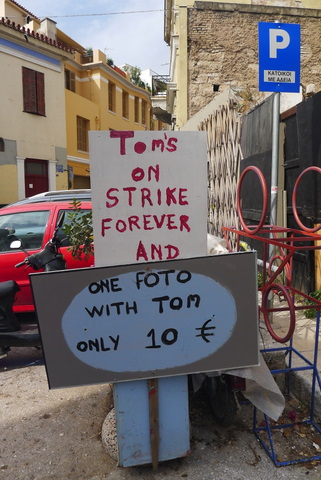
4 Comments
colin
What a lovely blog. Lets say a thanks to Mary that the lightnening struck the cross of the church rather than the cross of your geodesic tent – I am sure Zeus has a very fine aim and must have been distracted!
Wishing you peace and joy.
Pa
xx
beanonabike
Yes, luckily for me it would seem Zeus had an ‘off day’ with his thunderbolts on that particular occasion! Glad you’re enjoying the blog and hope to speak soon. xx
Pat & Ken Brown (saw you last at Celia& Harry's 50th.)
Hi, Antony,
Your blogs make interesting reading, for ken & I, whose overseas tours are all in the past. Did you know that Janet (Clift as was, now Devlin) lives in Athens? Husband Eamonn is a physicist & Greek govt. employee of long-standing, they must have concerns about their future, too.
Anyway, no need for a reply – we look forward to more news of your experiences.
All the best, Pat.
beanonabike
Ah, no, I didn’t – it would have been nice to have met them to get their perspective on things…. Anyway, I really enjoyed exploring Athens as a city but won’t miss the crazy traffic! Visiting the Akropolis (and the new museum) was an incredible experience. A very special place. Glad to hear you’re still enjoying the blogette and all good wishes to you and Ken from the Island of Lesvos!